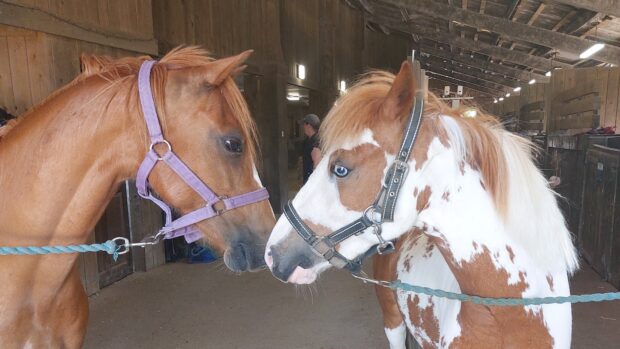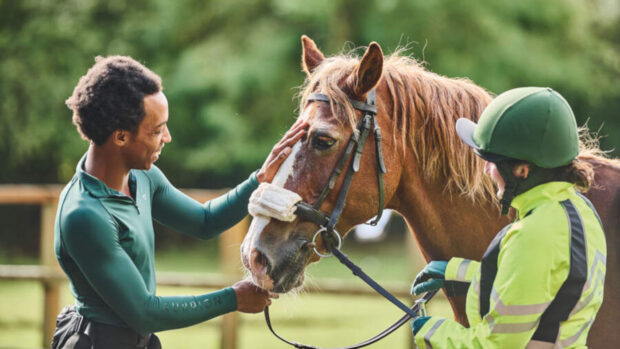There is more optimism than there was for the future of riding schools – as ideas to support and promote them have been and continue to be put in place.
Riding school owners joined British Horse Society (BHS) CEO James Hick and others at a round-table discussion at Talland School of Equitation on 20 November, after the BHS coaches’ convention.
Mr Hick told H&H that the convention, which was sold out with 300 attendees and had a waiting list, was a “great day”. But he wanted to stress the work being done to support riding schools.
He cited BHS figures showing that 250 schools have closed since 2018 (news, 9 March).
“There are many reasons they’re closing, but the threat that runs through all schools is a lack of qualified staff,” he said. “That means they can’t be as productive as they want to be; we found most schools have 30% less head count than they’d like, and 50 people on the waiting list, who they can’t help as they haven’t got the staff.”
Mr Hick said the cost-of-living crisis is a big issue and cited business rates as “one of the big ones”. He said action taken by the BHS includes setting up a team dedicated to supporting riding schools, two years ago, which can give legal advice and signpost to funding streams or other support. There have also been 70 “coffee mornings”, to bring schools together to discuss issues and share ideas. The BHS career transition fund, which has supported more than 1,300 potential coaches’ training so far, also supports further education students with vouchers, which go back to riding schools.
“Specifics from the round table include that we need to continue to work as collaboratively as possible with college students to ensure the curriculum they work to supports them in being as job-ready as possible. We’re doing that, and many schools are working with colleges to create a talent pipeline.
“We need to keep focused on business rates, although it will be difficult to make progress on that, and we need to collectively promote the good careers and workplaces at every riding school.”
Mr Hick said another key is improving productivity by using quieter times, such as weekdays. He said there were “great examples” of schools diversifying into apprenticeship training, as alternative education providers with local authorities, for which there is funding.
The BHS also now has approved providers of pony parties, another way for schools to broaden their offering.
“I’m far more optimistic than I was at the start of this year,” he said. “I was worried about the cost-of-living crisis, and though it has bitten quite hard and is still a worry, riding schools have shown resilience, weathered it, looked for alternative revenue stream, and continue to have demand, which has never been higher. I hope now we’ve bottomed out and can continue to build on the vibrant and strong, positive opportunity for growth.”
Talland owner Pammy Hutton who, with Ingestre Stables owner Tim Downes has been supporting and raising funds for riding schools since Covid hit, agreed that rates is a major issue.
She came up with ideas including a national riding school week, with marketing and publicity, and special events and discounts at schools, and displays such as the one Talland once put on with a Cats theme, at the Royal Show.
“We’ve got to get back to inspiring people to ride,” she told H&H. “Small riding schools can’t find people at [BHS] stage two, and the minimum wage is going up again, which will affect everyone, and we can’t just pass it on to clients. I’m not God but I’m passionate about this.”
Mr Downes told H&H the round table was very useful. He believes one reason some schools may struggle is because of large mortgages, as they “build a huge asset”.
“The other big issue for everyone is rates,” he said. “We won’t get anywhere on that without a collaborative approach from all the organisations; what we pay for buildings per square foot is more than a company like Amazon. Ithat was sorted out, riding schools would be far more viable.
“Another thing is that so many people run riding schools and livery yards as non-viable businesses – they might be on their parents’ property and they’re not paying the bills, but they set the market price and everyone else goes by that.”
You might also be interested in:

‘On the brink of disaster’: stark warning for future of Britain’s riding centres

‘A dying breed’: riding schools speak out as they face toughest time yet

Subscribe to Horse & Hound magazine today – and enjoy unlimited website access all year round
Horse & Hound magazine, out every Thursday, is packed with all the latest news and reports, as well as interviews, specials, nostalgia, vet and training advice. Find how you can enjoy the magazine delivered to your door every week, plus options to upgrade your subscription to access our online service that brings you breaking news and reports as well as other benefits.




